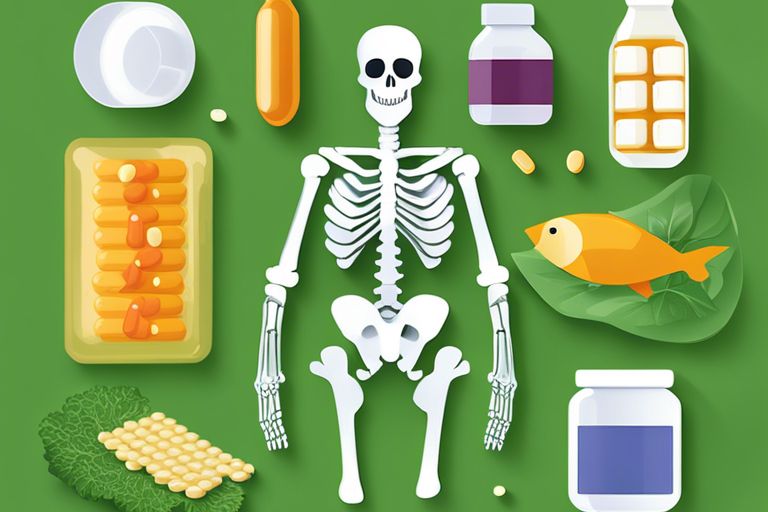Did you know that a deficiency in essential nutrients can lead to weak and brittle bones, making you more prone to fractures and osteoporosis? In this article, we will explore the potential benefits of nutritional supplements for improving bone health. With age, your body’s ability to absorb essential nutrients declines, but with the right supplementation, you can strengthen your bones and reduce the risk of fractures. However, it’s important to be aware of the dangers and side effects of certain supplements, so you can make an informed decision about your bone health.
Essential Nutrients for Bone Health
By ensuring that you are consuming the right nutrients, you can significantly improve your bone health. Key nutrients that play a crucial role in bone health include calcium, vitamin D, magnesium, and vitamin K. Each of these nutrients serves a specific function in supporting the strength and density of your bones.
Calcium: The Building Block of Bones
Calcium is the most abundant mineral in your body and is essential for the development and maintenance of strong, healthy bones. It serves as the primary building block for your bones and is crucial for proper muscle function and nerve transmission. Inadequate calcium intake can lead to a higher risk of osteoporosis and bone fractures, especially as you age.
Vitamin D: Facilitating Calcium Absorption
Vitamin D plays a critical role in maintaining optimal bone health by facilitating the absorption of calcium in your body. It helps regulate calcium and phosphorus levels in the blood, promoting the mineralization of bone and preventing bone loss. Without enough vitamin D, your body may struggle to utilize the calcium you consume, leading to weakened bones and an increased risk of fractures.
Magnesium and Bone Formation
Magnesium is another essential nutrient for bone health as it is involved in bone formation and influences bone density. It helps regulate calcium levels and aids in the activation of vitamin D, contributing to the maintenance of strong and healthy bones. Without sufficient magnesium, your body may struggle to maintain bone density, putting you at risk of bone-related issues.
Role of Vitamin K in Bone Metabolism
Vitamin K is a key nutrient that is essential for bone metabolism. It plays a vital role in regulating calcium and promoting bone mineralization. Vitamin K helps to modify a protein involved in calcium transport, which is necessary for bone formation and repair. Without enough vitamin K, your bones may be more susceptible to fractures and reduced bone density.
Popular Supplements for Bone Health
Despite the growing popularity of nutritional supplements for bone health, the evidence supporting their efficacy is still limited. However, there are a few popular supplements that have been studied for their potential benefits in improving bone health. In a recent study published in Nutrients, researchers investigated the effects of nutritional supplements and skeletal health and found some promising results.
Glucosamine and Chondroitin
Glucosamine and chondroitin are commonly used supplements for joint health, but some research suggests that they may also have potential benefits for bone health. These supplements are believed to support the production of collagen, which is an essential component of bones and joints. While the evidence is not definitive, some studies have shown that glucosamine and chondroitin may help reduce the risk of osteoporosis and improve bone density.
Omega-3 Fatty Acids
Omega-3 fatty acids are known for their anti-inflammatory properties and their potential benefits for cardiovascular health. Some studies have also suggested that omega-3s may play a role in maintaining bone health. These essential fatty acids are believed to have a positive impact on bone mineral density and may help reduce the risk of fractures. Including sources of omega-3 fatty acids in your diet, such as fatty fish or fish oil supplements, may be beneficial for your bone health.
Collagen Supplements
Collagen is a protein that provides structure to your bones, muscles, skin, and tendons. As you age, your body’s natural collagen production begins to decline, which can impact your bone health. Collagen supplements have gained popularity for their potential to support bone health by promoting bone density and strength. There is some evidence to suggest that collagen supplementation may help improve bone mineral density and reduce the risk of fractures, especially in postmenopausal women.
Herbal Remedies and Bone Health
In addition to conventional supplements, there are also several herbal remedies that are believed to support bone health. Herbs such as red clover, black cohosh, and horsetail have been traditionally used to promote bone health and may offer potential benefits. However, it’s important to approach herbal remedies with caution, as their safety and efficacy have not been thoroughly studied. Some herbal supplements may interact with medications or have adverse effects on your bone health, so it’s essential to consult with a healthcare professional before using them.
When considering nutritional supplements for bone health, it’s important to approach them with caution and be mindful of the potential risks and benefits. While some supplements may offer promising results, others may have adverse effects on your bone health. It’s essential to consult with a healthcare professional before adding any new supplement to your routine to ensure that it is safe and appropriate for you. Remember to prioritize a balanced diet, regular exercise, and other lifestyle factors that are essential for maintaining strong and healthy bones.

Scientific Evidence on Supplements and Bone Health
After reaching a certain age, it’s not uncommon for you to start considering your bone health and wonder if nutritional supplements could help. There is plenty of information out there, and it’s important to rely on scientific evidence to make the best decisions for your health. According to the Royal Osteoporosis Society, taking the right vitamins, minerals, and nutrients can support your bone health. You can learn more about them here.
Clinical Trials and Research Findings
Various clinical trials and research studies have been conducted to investigate the impact of nutritional supplements on bone health. Research has shown that certain supplements, such as calcium, vitamin D, and vitamin K, can play a crucial role in maintaining strong and healthy bones.
The Efficacy of Supplements in Osteoporosis Prevention
For individuals at risk of osteoporosis, supplements can be an important tool in preventative care. Studies have indicated that adequate intake of calcium, in combination with vitamin D, can significantly reduce the risk of osteoporosis and fractures.
Supplements vs. Dietary Sources of Nutrients
While supplements can be beneficial, it’s important to remember that they should not entirely replace a healthy diet. Your body is better able to absorb nutrients from food, so it’s important to include a variety of nutrient-rich foods in your diet to support overall bone health.
Considerations and Safety
Lastly, when considering the use of nutritional supplements for bone health, it’s important to understand the potential considerations and safety concerns. While some supplements may offer benefits, there are also important factors to keep in mind to ensure your safety and the effectiveness of the supplements you choose.
Appropriate Dosages and Potential Overdoses
When it comes to nutritional supplements for bone health, it’s crucial to follow the recommended dosages. Taking too much of certain vitamins and minerals, such as calcium, vitamin D, or vitamin K, can lead to potential overdoses. Overdosing on these nutrients can have serious health implications and may even negatively impact bone health. Always consult with a healthcare professional to determine the appropriate dosage for your individual needs.
Interactions with Medications
Another important consideration when it comes to nutritional supplements for bone health is the potential for interactions with other medications you may be taking. Some supplements can interfere with the absorption or effectiveness of certain medications, which can have negative implications for your overall health. It’s essential to discuss any supplements you’re considering with your healthcare provider to ensure they won’t interact negatively with your current medication regimen.
Quality and Regulation of Supplements
When choosing nutritional supplements for bone health, it’s crucial to consider the quality and regulation of the products you’re considering. Not all supplements are created equal, and some may contain contaminants or impurities that could be harmful to your health. Look for supplements that have been independently tested by third-party organizations for quality and purity. Additionally, be sure to consider the reputation and credibility of the manufacturer. 3 Vitamins And Supplements For Bone Health can help you make an informed decision.
Can Nutritional Supplements Improve Bone Health?
Presently, there is evidence to support the idea that nutritional supplements can improve bone health by providing essential vitamins and minerals that contribute to bone density and strength. However, it is important to remember that supplements should not be a replacement for a well-balanced diet and regular exercise, which are also crucial for maintaining bone health. It is also important to consult with your healthcare provider before beginning any new supplement regimen, as certain supplements may interact with medications or have adverse effects on your overall health. Ultimately, while nutritional supplements can play a beneficial role in supporting bone health, they are just one piece of the puzzle in maintaining strong and healthy bones.


